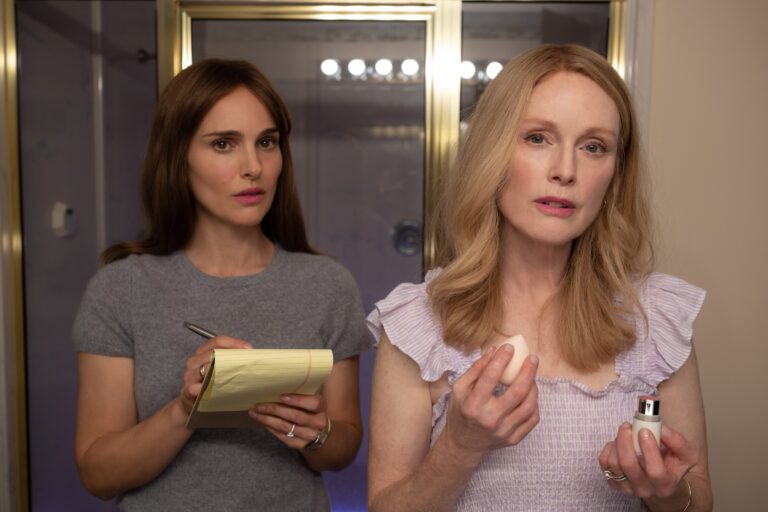May December (2023 | USA | RUNTIME | Todd Haynes)
The names Mary Kay Letourneau and Vili Fualaau are nowhere to be found in the press materials for Todd Haynes’s new film May December, but anyone alive in 1997 will instantly recognize their story as the launching point for Samy Burch’s screenplay and Julianne Moore’s uncanny performance. Letourneau, of course, was a thirty-four-year-old teacher in Burien, Washington who was convicted of child rape for having sex with her former student, the then twelve-year-old Vili Fualaau. She gave birth to his child while awaiting sentencing, re-offended by having sex with him again after serving a six month plea deal, gave birth to his second child while serving the maximum prison sentence, and married him at age 21 soon after her release. The sickening and mind-boggling case was a tabloid sensation far beyond King County.
May December transposes the story to Savannah, Georgia; situates their illicit meetings in a pet store; and changes some names (Gracie and Joe). The story picks up with their youngest children (fraternal twins pylayed by Elizabeth Yu and Gabriel Chung) on the verge of high school graduation. By this point, Joe (Charles Melton) now about the same age as Gracie would have been at the time of the crime, has settled into a kind of dad-life normalcy, grilling hot dogs for a cook-out and being chided by his now-wife about his beer consumption. Into this milieu comes a big name actress (Natalie Portman) who’s paying an extended visit to study Gracie in order to play her in what she describes as an independent movie that’s aiming to get a new perspective on their scandalous story. Immediately, with zealous camera movement and an aggressively dramatic score, Haynes has built a deeply meta- hall of mirrors of lush vegetation, heavy-handed butterfly imagery, a waterfront McMansion, and small-town claustrophobia.
Julianne Moore, a frequent Haynes collaborator, is perhaps too easily taken for granted for her willingness to be fearlessly unvarnished in her approach to loathsome characters. Here, on the verge of caricature, she echoes Letourneau’s pale blonde look, precise make-up, and speaks with a pronounced lisp. Her Gracie is controlling yet fragile, seemingly incapable of reflection, and prone to self-centered emotional collapses at the merest slights. She’s a remorseless monster, the most childish person in any room, yet someone who has pushed full steam ahead to shape a well-appointed life that’s to her liking. As a human being, the character is relentlessly infuriating; as a piece of acting, Moore’s work is typically outstanding.
Natalie Portman’s Elizabeth is effectively parachuting into an utterly bizarre situation. As a famous actress she’s as instantly recognizable as Gracie and Joe, just for different reasons. As the outsider she’s an audience surrogate, a kind of detective who’s delicately attempts to understand what makes Gracie tick. Portman’s is a marvelous feat of performances within performances: she’s an actress playing an actress who’s constantly modulating behavior to curry favor with whomever she’s with, be it Gracie, her family, or other people in the town who are part of their lives. Both actor and character tiptoeing on a perilously high wire, with some breathtaking work of mirroring and manipulation. Most importantly, she’s negotiating how to get inside Gracie’s skin without getting under it.
It’s a great trick of storytelling that Haynes situates the audience perspective with Elizabeth. She’s the lens through which we’re coming to understand this bizarre equilibrium achieved by having spent decades acclimating to not looking directly at the horrible crime at the heart of their family and town. We’re inclined to cast our lot with this fellow visitor, to believe what she says and to trust her motivations, largely because the “normalcy” achieved is still so deeply alien.
The true revelation, though, is Charles Melton as Joe. For much of the film, he portrays the now grown-up victim as quietly oblivious. He’s a now-grown man who loves his wife and kids; no matter how strangely it started, this life is the only one he’s known. There’s a sweet sadness to his performance, and by design his character is almost an afterthought to the metamorphic fireworks transpiring between Julianne Moore and Natalie Portman. But be it through brief glimpses of his life outside of Gracie’s gaze — raising butterflies in home incubators, texting with an internet acquaintance, in increasingly charged interactions with Elizabeth, or in a particularly heartbreaking interaction with his son — to the tragedy of his situation comes slowly into focus. Melton’s navigation of his character’s slow overdue realization of the obvious is handled with heartbreaking delicacy.
Moment-to-moment, I had no idea what kind of movie I was watching. It’s packed with both comedy and dramatic tension and they often collide and feel awkwardly mismatched. In that way it’s unsettling and mysterious. Throughout, Haynes’s fondness for employing the tropes of melodrama seems heavy-handed and played for laughs. As an audience we still flatter ourselves to believe that we’re watching a prestige actress prepare to make the type of highbrow movie that we, a sophisticated audience, would want to watch during awards season. It’s an especially cunning employment of a mode of filmmaking and breathtakingly big performances to numb us to the emotional revelations yet to come.
Is the resulting film terrible or great? Is it a comedy or a tragedy? Subtly nuanced or complete manipulative melodramatic trash? Incredibly precise or a hot mess? Yes, indeed. To all of that.
May December has a two-week theatrical run beginning on November 17th (locally, at the Landmark Crest in Shoreline) before streaming exclusively on Netflix beginning on December 1st.



